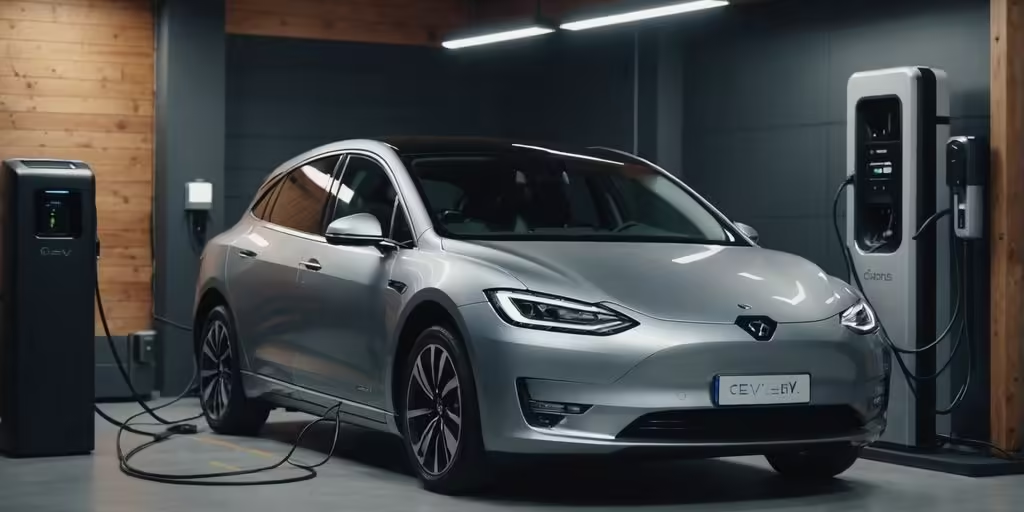Email:
info@fixiz.co.uk
Physical address:
128 City Road, EC1V 2NX, London,UK

As electric vehicles (EVs) become more common, having a good home charging setup is key. It makes charging easy and helps you save money and energy. This article will show you how to make the best home charging system for your EV.
Different electric vehicles (EVs) have unique charging capacities and needs. For example, some cars can fully charge overnight with a standard Level 1 charger, while others might need the faster charging of a Level 2 charger. Knowing your vehicle’s range and daily driving habits is key to picking the right home charging setup.
To figure out your energy needs, start by keeping a log of your daily mileage for 1-2 weeks. This will help you understand how much energy you use each day.
Next, research the full charge times and rates for your current and any future EV models you might consider. This will help you estimate your home charging needs. Look for chargers that can meet or exceed your daily energy use to ensure you have enough flexibility.
Think about any future EVs you might buy. Preparing for future upgrades now can save you from having to make big changes later. For example, installing conduits during the initial setup can make it easier to upgrade cables in the future.
Planning ahead for future EV purchases can save you time and money down the road.
Choosing the right EV charger can greatly improve your charging experience and prepare your setup for the future. Find the right electric vehicle charger with our expert guide.
Installing a home EV charging station involves more than just buying a charger. It often requires understanding your home’s electrical capacity and possibly upgrading your electrical panel. Professional installation by a qualified electrician is recommended to ensure the system is safely integrated into your home’s infrastructure.
To get the most out of your EV, it’s important to charge it during off-peak hours. Many places have lower electricity rates at these times, which can help you save money. Smart chargers can make this even easier by automatically setting the best times to charge.
Charging your EV during off-peak hours can significantly reduce electricity costs. Many regions offer lower rates during these times, which can be leveraged to minimize the impact on your electricity bill. Smart chargers can further enhance this efficiency by automatically adjusting the charging schedule based on the cheapest and most energy-efficient times.
Optimizing your home’s energy use can enhance the efficiency of your EV charging setup and reduce costs:
Smart chargers can make a big difference in how efficiently you charge your EV. They can automatically adjust the charging schedule to the most cost-effective times and provide data on your charging habits. This helps you get more miles per charge and save money in the long run.
By taking these steps, you can maximize both the economic and environmental benefits of owning an electric vehicle, ensuring that your home charging system is as efficient and effective as possible.
Pairing your home charging station with renewable energy sources, such as solar panels, can further reduce the environmental impact of your EV. Solar energy can potentially power your vehicle with zero carbon emissions and lower the cost of charging at home.
Regular maintenance of your EV charging station is crucial for safe and efficient operation. This includes checking for any physical damage, ensuring all connections are tight, and verifying that the charger is clean and free from debris. Regular safety checks by a professional can help prevent electrical hazards and extend the lifespan of your charging equipment.
Modern charging systems often come with software that allows you to monitor and control your charging from your smartphone or computer. These systems can provide valuable insights into your charging habits and help optimize your charging strategy to reduce costs and increase efficiency. Integration with home energy management systems can also streamline the energy use throughout your home, enhancing overall energy efficiency.
Optimizing your home EV charging setup is more than just picking the right charger. It’s about knowing your daily needs, using smart tech, and maybe even adding renewable energy sources. By doing these things, you can save money and help the environment. This way, your home charging system will be as good as it can be.
The right type of EV charger depends on your daily driving needs and the specific requirements of your electric vehicle. Level 1 chargers are slower but can be plugged into a standard outlet, while Level 2 chargers are faster and might need special installation.
While some people might be comfortable with DIY installation, it’s usually safer to hire a professional. They can ensure the charger is installed correctly and meets all local electrical codes.
You can make your EV charging more efficient by charging during off-peak hours, using smart chargers, and managing your home’s energy use effectively. Integrating renewable energy sources like solar panels can also help.
In some cases, yes. If your current electrical panel doesn’t have enough capacity to handle the additional load of an EV charger, you may need to upgrade it. A professional electrician can assess your situation and provide guidance.
Yes, many areas offer incentives, rebates, or tax credits for installing home EV chargers. Check with your local government or utility company to see what programs are available in your area.
If your EV charger stops working, first check the connections and reset the charger. If it still doesn’t work, consult the user manual for troubleshooting tips or contact a professional for assistance.